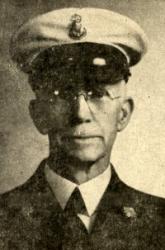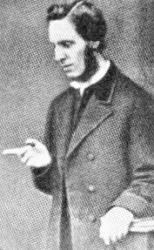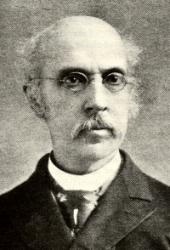Planning worship?
Check out our sister site, ZeteoSearch.org,
for 20+ additional resources related to your search.
- |
User Links
Person Results
‹ Return to hymnal









Export as CSV
J. H. Tenney

1840 - 1918 Hymnal Number: 255 Composer of "[Where will you spend eternity?]" in Voices of Victory John Harrison Tenney, 1840-1918
Born: November 22, 1840, Rowley, Massachusetts.
Born just after the presidential campaign of "Tippecanoe and Tyler, too," Tenney was named after American president William Henry Harrison. A deacon in the Congregational Church in Linebrook, Massachusetts, he edited or was associate editor of over 30 books, and contributed to hundreds more. His works include:
American Male Choir
Temperance Jewels, with Elisha Hoffman (Boston, Massachusetts: Oliver Ditson & Company, 1879)
Bells of Victory, with Elisha Hoffman (Boston, Massachusetts: Oliver Ditson & Company, 1888)
Gems of Gospel Song
Golden Sunbeams
Sharon’s Dewy Rose
Songs of Faith
Shining Light
Songs of Joy
Sparkling and Bright
Spiritual Songs, Nos. 1 and 2
Sweet Fields of Eden
The Beacon Light
The Singing School Banner
The Anthem Offering
The American Anthem Book
The Crown of Praise
Sources--
Hall, pp. 219-22
Music--
Asilomar
Bogotá
Beyond the Swelling Flood
Cancún
Come to Jesus
Ever Will I Pray
Hallowed Hour of Prayer
Jesus Is Passing This Way
Jubilate!
My Anchor Is Holding
Nothing Between
Onward Christian Soldiers
Sabbath Bell
San Francisco
We’ll Never Say Goodbye
Where Will You Spend Eternity?
--www.hymntime.com/tch
J. H. Tenney
John E. Gould

1821 - 1875 Person Name: J. E. Gould Hymnal Number: 302 Composer of "[Jesus, Saviour, pilot me]" in Voices of Victory John Edgar Gould USA 1821-1875. Born in Bangor, ME, he became a musician. He managed music stores in New York City and Philadelphia, PA., the latter with composer partner, William Fischer. He married Josephine Louisa Barrows, and they had seven children: Blanche, Marie, Ida, John, Josephine, Josephine, and Augusta. He compiled eight religious songbooks from 1846 thru 1869. He died while traveling in Algiers, Africa, and was buried in Philadelphia, PA.
John Perry
John E. Gould
Joseph Philbrick Webster

1819 - 1875 Person Name: Jos. P. Webster Hymnal Number: 179 Composer of "[There's a land that is fairer than day]" in Voices of Victory Webster composed and performed popular music. He studied with Lowell Mason and was active musically in New York, New Jersey and Connecticut, and directed a quartet company called the Euterpeans. In 1851, he moved to Madison, Indiana, followed by Chicago, Illinois (1855); Racine, Wisconsin (1856); and finally Elkhorn, Wisconsin (1859).
Webster wrote over a thousand ballads and many hymns. His most famous secular song was his 1857 Lorena (words by Henry D. L. Webster). In its day, it was said to have been second in popularity only to Stephen Foster’s Suwanee River, and was sung by thousands of soldiers on both sides of the American civil war. An instrumental version appears in the 1939 film Gone with the Wind, when Scarlett O’Hara is manning the stall at the charity dance in her mourning outfit. The tune also made an appearance in two John Ford films: The Searchers, 1956, arranged by Max Steiner, and The Horse Soldiers, 1959, arranged by David Buttolph.
(http://www.hymntime.com/tch)
Joseph Philbrick Webster
Samuel W. Beazley

1873 - 1944 Hymnal Number: 113 Composer of "[Rally Christian to the call of heav'nly love]" in Voices of Victory Samuel W. Beazley was born in Sparta, Virginia in 1873. He was a music scholar and taught music at Shenandoah College for five years. He composed over 4,000 gospel songs during his lifetime. Samuel W. Beazley maintained a successful publishing business in Chicago, Illinois. He died in Chicago on September 16, 1944. He was inducted into the Gospel Music Hall of Fame in 1992.
NN, Hymnary editor. Source: www.gmahalloffame.org
Samuel W. Beazley
Frank C. Huston

1871 - 1959 Person Name: F. C. H. Hymnal Number: 150 Author of "It Pays to Serve Jesus" in Voices of Victory Huston, Frank C. (Orange, Indiana, September 12, 1871--October 14, 1959, Jacksonville, Florida). Both parents were musically inclined, and at the age of 12, he was playing cornet in a local concert band. By the age of 17, he was singing regularly in male and mixed voice units, and at 18, he was conducting church music. Education: Moody Bible Institute. Studied with W.M. Hackleman (a cousin), D.B. Towner, W.C. Caffin, and Charles H. Gabriel.
On May 13, 1894, he married Bertha Martin. There were seven children. He spent a brief period as a public school teacher, then became a singing evangelist and traveled for a time with the Charles Reign Scoville Party. He served as Chaplain in the First World War and continued his interest and participation in patriotic organizations. He served a term as Commander-in-Chief of the Sons of Union Veterans of the Civil War and a term as national president of the Federated Patriotic Societies. While in his eighties, he served as chaplain for the Jacksonville Chapter of the Coast Guard.
He was ordained to the ministry of the Christian Church (Disciples of Christ) in 1915. He owned and operated his own publishing company in Indiana for a number of years and was a member of the American Society of Composers, Authors, and Publishers. Frank Huston is credited with more than 400 songs, some patriotic. His two best-known hymns, for which he wrote both words and music, are: "It Pays to Serve Jesus," written in 1909, and "The Christ of the Cross," which was copyrighted in 1924. Among the several hundred others are: "Keep on Believing," "The Word of God Shall Stand," "Lead On, O Christ, Thou Holy One," and "O Holy Day of Pentecost." A book, On Hundred Hymns and Gospel Songs, was published in 1955. For the last 18 years of his life, Huston lived in Florida Christian Home in Jacksonville, a home for the aged maintained by the Christian Church. There, he was active with his music and voluminous correspondence. Funeral services were held in the Edgewood Avenue Christian Church in Jacksonville, Florida, and interment was in Knightstown, Indiana.
--Carlton C. Buck, DNAH Archives
=============================
During World War I, Governor Goodrich of Indiana appointed Huston chaplain of the 150th Field Artillery, Rainbow Division, but through some mistake he was never called to join the regiment before the war ended. His services, however, were in great demand in his home state and city, and he became widely known as the "Singing Chaplain." In World War II, Huston volunteered his services to the Coast Guard Auxiliary. He was made a boatswain’s mate when he was 74 and given duty as a recruiter. He was discharged as an ensign. His works include:
Selected Sacred Songs (Jacksonville, Florida: Frank C. Huston, 1937)
Frank C. Huston
Edward F. Rimbault

1816 - 1876 Person Name: E. F. Rimbault Hymnal Number: 97 Composer of "[O happy day! that fixed my choice]" in Voices of Victory Edward Francis Rimbault PhD LLD United Kingdom 1816-1876. Born in Soho, London, England, son of an organist and composer of French descent, he was taught music by his father., Samuel Wesley, and Wiliam Crotch. At age 16 he became organist of the Swiss Church in Soho. He later became organist at various churches, including St Peter’s, Vere Street, and St John’s Wood Presbyterian Church. He edited many collections of music, journals, and publications of music, and arranged music compositions. In addition to editing or arranging contemporary operas, he had a strong interest in editing or arranging earlier English music. He studied the musical treatises in the library of Archbishop Tenison, one of the oldest public libraries in London. In 1838, At age 22 he began lecturing about the history of English music, and was in much demand due to the interest aroused. He did editorial work for the Percy Society, the Camden Society, the Motet Society, and the Handel Society. For the latter he edited the “Messiah”, “Saul”, and “Samson” He was elected a Fellow of the Society of Antiquaries, and was granted membership in the Academy of Music in Stockholm, Sweden. Gottingen University also conferred upon him a PhD. His reputation was such that he was offered a teaching position at Harvard University in the U.S., which he turned down. In 1848 he was given an honorary degree by the University of Oxford. In 1849 he published a collection of English nursery rhymes and the tunes to which they were sung. Rimbault authored 76 books, a few named here include : “Bibliotheca madrigaliana” (1847); “The pianoforte” (1860); “Early English organ builders and their works” (1865). In 1855 he co-authored “The organ- its history and construction” with John Hopkins. He did a small amount of composing as well. He wrote an operetta in 1838, and a musical drama. He also composed a large number of pianoforte scores for operas by others. He was an admirable harmonium player. Traveling to various auctions for years, he accumulated a rare collection of books. After his death his extensive collection was auctioned off in 1877, with many items going to the British Library. About 300 items were sold to an individual, and upon his death in 1888, the ‘Drexel collection’ was bequeathed to the Lenox Library (precursor of the New York Public Library). Today, the collection is part of the Music Division of the NY Public Library for the Performing Arts. He was an author, editor, arranger, composer, lithographer, translator, scribe, adapter, and bookseller. He died at London, England. No information found regarding a family.
John Perry
Edward F. Rimbault
Samuel O'Malley Cluff

1837 - 1910 Person Name: S. O'Maley Cluff Hymnal Number: 222 Author of "I Am Praying for You" in Voices of Victory Rv Samuel O'Malley Gore Cluff (Clough) United Kingdom 1837-1910. Born in Dublin, Ireland, he attended Trinity College and became a minister in the (Anglican) Church of Ireland. He pastored at various locations in Ireland. In 1884 he became leader of the Plymouth Brethren. He married Anne Blake Edge. They had four children. He wrote hymn poems and about 1000 songs. He composed many melodies and oratories. He died in Abbeyleix, Ireland. While holding crusades in Scotland with D. L. Moody, Ira Sankey came across Cluff's poem about prayer and composed the music for it, used in subsequent crusades.
John Perry
Samuel O'Malley Cluff
Henry S. Perkins

1833 - 1914 Person Name: H. S. Perkins Hymnal Number: 95 Composer of "[Blessed be the Fountain of blood]" in Voices of Victory Henry Southwick Perkins USA 1833-1914. Born at Stockbridge, VT, the son of musical parents (both singers) he was trained musically, primarly by his father. He attended some of the best literary schools in his youth. His formal music education began in 1857, when he entered the Boston Music School, graduating in 1861. For over 20 years he devoted considerable time to conducting music festivals and conventions throughout America, from ME to CA. He also taught music in NY, OH, IN, WI, IA, CO, KS, and TX. He served as Professor of Music at the University of IA (1867-69), principal of the IA Academy of Music, Iowa City, IA, for five years, and principal at the KS Normal Music School for five consecutive summers. He composed vocal music for choirs, Sunday school, public schools, choir societies, conventions and festivals. He helped organize the Music Teachers’ National Association in 1876, serving in most capacities there between (1887-1897). He also organized the IL Music Teachers Association in 1886, serving as its president for 10 years. He settled in Chicago in 1872 and was a noted music critic for the papers there. In 1891 he established the Chicago National College of Music. He published several hymn books, including: “The nightingale” (1860), “The church bell” (1867), “The song echo” (1971), “The sunny side” (1875), “The shining river” (1875), and “Gospel bells” (1883). He died at Chicago, IL.
John Perry
Henry S. Perkins
John R. Clements

1868 - 1946 Hymnal Number: 81 Arranger of "I Shall Not Pass Again This Way" in Voices of Victory John R. Clements was born in County Armagh, Ireland 28 November 1868 and was brought to the United States at the age of two years. He worked at the age of thirteen as a retail grocery clerk and had a successful wholesale grocery business. He began writing poetry when he was young.
Dianne Shapiro, from "The Singers and Their Songs: sketches of living gospel hymn writers" by Charles Hutchinson Gabriel (Chicago: The Rodeheaver Company, 1916)
John R. Clements
George Heath
1745 - 1822 Hymnal Number: 288 Author of "My Soul, Be On Thy Guard" in Voices of Victory Rv George Heath DD United Kingdom 1745-1822. Born at Exeter, Devon, England, he was educated at the Dissenting Academy and King’s College, Cambridge. He married Mary Ann Kean, and they had 4 children: Louisa, John, Charles, and Benjamin (also a minister). He served as pastor of the Honiton, Devonshire, Presbyterian Church, but proved unworthy and was dismissed for cause. He later became a Unitarian minister. In 1781 he published “Hymns & poetic essays sacred to the worship of the Deity”. He also authored a “History of Bristol”. He became Headmaster of Eton College (1792-1802). He joined the Anglican Church and became Canon of Windsor (1800-1822), Rector of Monks Risborough, Vicar of Sturminster Marshall, Dorset, Vicar of Piddletown, Vicar of East Beachsworth (1805-1814), and Fellow of the Royal Society (1795-1822). He was appointed to the 4th stall in St. George’s Chapel in 1800, Windsor Castle, and died at his residence in the Cloisters, Windsor Castle.
John Perry
=======================
Heath, George, became pastor of a Presbyterian Church at Honiton, Devon, in 1770, and died in 1822. He published a History of Bristol, 1797. Also Hymns and Poetic Essays Sacred to the Public and Private Worship of the Deity, &c, Bristol, 1781, from which "My soul, be on thy guard" (Steadfastness), is taken.
--John Julian, Dictionary of Hymnology, Appendix, Part II (1907)
George Heath


 My Starred Hymns
My Starred Hymns


